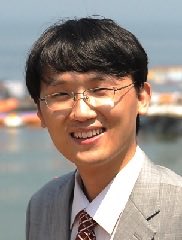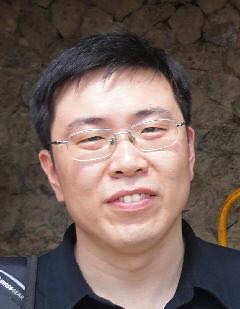|
|
|
Background and Motivation
During the past decade, machine learning researches in China have been growing in a blooming way. This is witnessed by the increasing number of works appeared in major machine learning related conferences and journals, and also numerous successful applications of machine learning techniques in major Chinese high-tech companies such as
Huawei, Tencent, Baidu, Alibaba, etc. There are also many domestic machine learning conferences regularly held in China which attract a significant number of participants, such as the biennial Chinese Conference on Machine Learning, the annual Chinese Workshop on Machine Learning and Applications, the annual Chinese Vision and Learning Seminar, etc.
To take full advantage of the opportunity that ACML is to be held in Hong Kong, a dedicated full-day workshop for machine learning researchers and practitioners in China is organized. This workshop would be a great chance for sharing ideas and expertise among interested participants, encouraging students and junior researchers to get suggestions and advices from senior experts, and also fostering connections and possible collaborations between Chinese and International machine learning communities.
Technical Program
Date : Nov. 20, 2015
Avenue: Hong Kong Science Park
09:00-09:05 Opening
09:05-09:55 Keynote talk A Theoretical Story of Deep Neural Networks by Dr. Tie-Yan Liu
09:55-10:35 Invited talk When Bayes Meets Big Data by Prof. Jun Zhu
10:30-11:00 Coffee break
11:00-11:40 Invited talk Binary Relevance for Multi-Label Learning by Prof. Min-Ling Zhang
11:40-12:20 Invited talk Distance Learning in Person Re-identification by Prof. Wei-Shi Zheng
12:20-14:30 Lunch break
14:30-15:10 Invited talk Multi-Level Multi-Task Learning by Prof. Yu Zhang
15:10-16:00 Keynote talk by Prof. James Kwok
16:00-16:50 Poster session (with coffee break)
Talk Information
 'Title to be available' 'Title to be available'
Speaker: James Kwok, Hong Kong University of Science and Technology
 A Theoretical Story of Deep Neural Networks A Theoretical Story of Deep Neural Networks
Speaker: Tie-Yan Liu, Microsoft Research Asia
Abstract: Deep neural networks (DNN) have demonstrated outstanding performances in many real applications, such as speech recognition, image classification, and natural language processing. However, it seems that the theoretical understanding of DNN is far behind its practical success. In this talk, I will first give a review of the existing theoretical studies on DNN, mainly from the perspectives of generalization ability and approximation ability. Then, I will introduce our recent research on this topic. Specifically, we start with the margin bound - the expected test error of a model can be upper bounded by its empirical margin error plus a Rademacher Average (RA) based capacity term. On this basis, we derive an upper bound for the RA of DNN (which increases with the increasing depth of the network structure), and show that deeper networks tend to generate smaller margin error on the given training data due to larger representation power (measured by Betti numbers based
> complexity). These findings indicate that for DNN with restricted total number of parameters, arbitrarily increasing the depth is not always good since there is a clear tradeoff between its positive and negative impacts on the test error. These findings also inspire us to look for alternative ways to achieve the positive impact of depth, e.g., by directly imposing a margin-based penalty terms to the loss function so as to purposely reduce empirical margin error without increasing depth. Our experimental results show that in this alternative way, we can achieve significantly better test performances on several datasets.
Short Biography: Tie-Yan Liu is a principal researcher of Microsoft Research, an adjunct professor of Carnegie Mellon University (LTI), and an honorary professor of University of Nottingham. His research interests include machine learning, information retrieval, and algorithmic game theory. He is well known for his pioneer work on learning to rank for information retrieval. He has authored the first book in this area (which is among the top-10 Springer CS books by Chinese authors), and published tens of impactful papers on both algorithms and theories of learning to rank (with around 10K citations in the past few years). He has also published extensively on other topics: his paper on graph mining won the best student paper award of SIGIR (2008); and his paper on video shot boundary detection won the most cited paper award of the Journal of Visual Communication and Image Representation (2004-2006). Tie-Yan has served as a program committee co-chair of many conferences including ACML
> (2015), WINE (2014), and AIRS (2013), a local co-chair of ICML (2014), a tutorial co-chair of SIGIR (2016) and WWW (2014), a doctorial consortium/PhD symposium co-chair of WSDM (2015) and WWW (2016), a demo/exhibit co-chair of KDD (2012), and an area/track chair of AAAI (2016), NIPS (2015), KDD (2015, 2016), ACML (2014), SIGIR (2008-2011), AIRS (2009-2011), and WWW (2011, 2015). He is an associate editor of ACM Transactions on Information System (TOIS), an editorial board member of Information Retrieval Journal (INRT) and Foundations and Trends in Information Retrieval (FnTIR). He is a senior member of the IEEE and the ACM, as well as a senior member and distinguished speaker of the CCF.
 When Bayes Meets Big Data When Bayes Meets Big Data
Speaker: Jun Zhu, Tsinghua University, China
Abstract: Bayesian methods represent one important school of statistical methods for learning, inference and decision making. At the core is Bayes' theorem, which has been developed for more than 250 years. However, in the Big Data era, many challenges need to be addressed, ranging from theory, algorithm, and applications. In this talk, I will introduce some recent developments on generalizing Bayes' theorem to incorporate rich side information, which can be the large-margin property we like to impose on the model distribution, or the domain knowledge collected from experts or the crowds, and scalable online learning and distributed inference algorithms. The generic framework to do such tasks is called regularized Bayesian inference (RegBayes). Our O(1) Gibbs sampler can learn topic models with trillion parameters on TB datasets.
Short Biography: Dr. Jun Zhu is an associate professor at Department of Computer Science and Technology, Tsinghua University, and an adjunct faculty at Machine Learning Department, Carnegie Mellon University. He received his Ph.D. in Computer Science from Tsinghua in 2009. Before joining Tsinghua in 2011, he did post-doctoral research in CMU. His research interest lies in developing scalable machine learning methods to understand complex scientific and engineering data. Dr. Zhu has published over 60 peer-reviewed papers in the prestigious conferences and journals. He is an associate editor for IEEE Trans. on PAMI. He served as area chair for ICML, NIPS, UAI, IJCAI and AAAI. He was a local chair of ICML 2014. He is a recipient of the IEEE Intelligent Systems "AI's 10 to Watch" Award, NSFC Excellent Young Scholar Award, and CCF Young Scientist Award. His work is supported by the "221 Basic Research Plan for Young Talents" at Tsinghua.
 Multi-Level Multi-Task Learning Multi-Level Multi-Task Learning
Speaker: Yu Zhang, Hong Kong University of Science and Technology
Abstract: Multi-task learning aims to improve the generalization performance of multiple learning tasks by leveraging useful information among them. One core issue in multi-task learning is to identify the relations among tasks before using them to help the learning process and many methods have been proposed to learn different forms of task relations. In this talk, I will introduce a framework called multi-level multi-task learning, which decomposes the model parameters of all the tasks into multiple levels, to model complex task relations. Then two concrete learning algorithms under the framework will be discussed. The first algorithm, the multi-level task grouping method, learns different task groups in each level. Different from the first algorithm which assumes that different levels are independent, the second algorithm aims to learn tree structure among tasks by adding constraints among levels. Experiments on benchmark datasets show the effectiveness of the proposed algorithms.
Short Biography: Yu Zhang is a research associate at the Department of Computer Science and Engineering in the Hong Kong University of Science and Technology. He received the BSc and MEng degrees at the Department of Computer Science and Technology of Nanjing University respectively and the PhD degree at the Department of Computer Science and Engineering of the Hong Kong University of Science and Technology. His research interests mainly include machine learning and data mining. He is a reviewer for various journals such as JMLR, IEEE TPAMI, IEEE TNNLS, IEEE TMM and PR, and a program committee member for several international conferences including NIPS, ICML, IJCAI, AAAI, UAI, and so on. He has won the best paper award in the 26th Conference on Uncertainty in Artificial Intelligence 2010 and the best student paper award in the 2013 IEEE/WIC/ACM International Conference on Web Intelligence.
 Binary Relevance for Multi-Label Learning Binary Relevance for Multi-Label Learning
Speaker: Ming-Lin Zhang, Southeast University, China
Abstract: Binary relevance (BR) is arguably the most popular approach towards multi-label learning, which decomposes the multi-label learning problem into a number of independent binary classificaiton problems, one per category. In view of the well-known weakness of BR, i.e. ignorance of label correlations, a number of enhanced versions of BR have been developed in recent years by endowing BR with the ability of label correlations exploitation. Nonetheless, in addition to label correlations exploitation, there are several factors which need to be considered to make BR-based approach work effectively. In this talk, I will introduce some of our recent progresses on BR-based multi-label learning.
Short Biography: Min-Ling Zhang received the BSc, MSc, and PhD degrees in computer science from Nanjing University, China, in 2001, 2004 and 2007, respectively. Currently, he is a Professor at the School of Computer Science and Engineering, Southeast University, China. His main research interests include machine learning and data mining. In recent years, Dr. Zhang serves as the Program Co-Chairs of PRICAI'16, Publicity Co-Chair of ICDM'15, Workshop Co-Chair of ACML'14, SPC and PC member of various peer-reviewed conferences. He is on the editorial board of Frontiers of Computer Science, and has been the guest editor of the Machine Learning Journal. Dr. Zhang is secretary-general of the CAAI (Chinese Association of Artificial Intelligence) Machine Learning Society, committee member of the CCF (China Computer Federation) Artificial Intelligence & Pattern Recognition Society.
 Distance Learning in Person Re-identification Distance Learning in Person Re-identification
Speaker: Wei-Shi Zheng, Sun Yat-Sen University, China
Abstract: Matching people across nonoverlapping camera views at different locations and different times, known as person reidentification, is both a hard and important problem for associating behavior of people observed in a large distributed space over a prolonged period of time. Person reidentification is fundamentally challenging because of the large visual appearance changes caused by variations in view angle, gesture, lighting, background clutter, and occlusion. Due to these challenges, it is hard to extract distinctive and reliable visual features across camera views. Hence, seeking an optimal and robust similarity measure that quantifies a wide range of features against realistic viewing conditions is critically important for person reidentification. This talk will present our recent research works on distance learning for robust cross-view matching, including relative distance comparison model and its transfer extension for solving the open-world matching problem, an asymmetric view-transform distance model, a cross-scale subspace model, and a cross-scenario transfer model.
Wei-Shi Zheng received the PhD degree in applied mathematics from Sun Yat-Sen University in 2008. He is an associate professor in Sun Yat-sen University. He has been a postdoctoral researcher on the EU FP7 SAMURAI Project at Queen Mary University of London. He has now published more than 70 papers, including more than 40 publications in main journals (TPAMI,TNN,TIP,TSMC-B,PR) and top conferences (ICCV, CVPR,IJCAI,AAAI). He has joined the organisation of four tutorial presentations in ACCV 2012, ICPR 2012, ICCV 2013 and CVPR 2015 along with other colleagues. His research interests include person/object association and activity understanding in visual surveillance. He is a recipient of excellent young scientists fund of the national natural science foundation of China. He has joined Microsoft Research Asia Young Faculty Visiting Programme.
Workshop Organizing Committee & Contact
- Yang Yu, Nanjing University, email: yuy@nju.edu.cn
- Ping Luo, Institute of Computing Technology, Chinese Academy of Sciences, email: ping.luoul@gmail.com
- Yu-Feng Li, Nanjing University, email: liyf@nju.edu.cn
|






